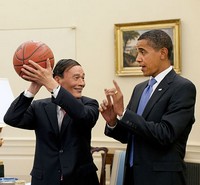When President Barack Obama was awarded the Nobel Peace Prize in 2009, Time magazine heralded it as the fourth Nobel award given “for not being George W. Bush.” While much of the world welcomed the departure of the American president many saw as a cocky cowboy, Chinese politicians quickly became nostalgic for the good ol’ days. Why do the Chinese prefer Bush to Obama? The reason, it seems, is that Obama is harder to read. While the U.S. continually calls for more transparency from China, the Chinese seek a clearer understanding of the Obama administration’s intentions toward China.
Obama entered office admired by the Chinese, particularly for his work as a community organizer in Chicago, and they expected him to make his mark domestically and internationally as a reformer. Internationally, his rhetoric was very different from the unilateralist rhetoric of primacy used by the Bush administration, and he made a specific point of toning down the anti-China oratory. But Chinese optimism about a better U.S.-China relationship has given way to disappointment, because from China’s perspective, that initially positive rhetoric has not aligned with U.S. policy or actions.
According to Chinese analysts, Republican administrations are generally easier to deal with than Democratic administrations, as Republicans are more predictable. Republicans are considered realists who talk tough and whose rhetoric matches their actions, so the Chinese know what to expect. From the Chinese perspective, Bush’s tough, cowboy persona was one they understood. But who is Barack Obama, they ask, and what does he really want from the U.S.-China relationship?

